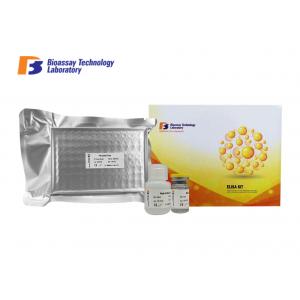Customer Elisa Assay Kit For Analyzing Rat Bone Morphogenetic Protein 4
Add to Cart

High Precision Rat Bone Morphogenetic Protein 4 ELISA Kit Customized BMP4 ELISA Kit
Cat.No E0266Ra
Size: 96 wells
Storage: Store the reagents at 2-8°C. For over 6-month storage refer to the expiration date keep it at -20°C. Avoid repeated thaw cycles. If individual reagents are opened it is recommended that the kit be used within 1 month.
*This product is for research use only, not for use in diagnosis procedures. It’s highly recommend to read this instruction entirely before use.
Intended Use
This sandwich kit is for the accurate quantitative detection of Rat Bone Morphogenetic Protein 4 (also known as BMP-4) in serum, plasma, cell culture supernates, cell lysates, tissue homogenates.
Assay Principle
This kit is an Enzyme-Linked Immunosorbent Assay (ELISA). The plate has been pre-coated with Rat BMP-4 antibody. BMP-4 present in the sample is added and binds to antibodies coated on the wells. And then biotinylated Rat BMP-4 Antibody is added and binds to BMP-4 in the sample. Then Streptavidin-HRP is added and binds to the Biotinylated BMP-4 antibody. After incubation unbound Streptavidin-HRP is washed away during a washing step. Substrate solution is then added and color develops in proportion to the amount of Rat BMP-4. The reaction is terminated by addition of acidic stop solution and absorbance is measured at 450 nm.
Precautions
- Prior to use, the kit and sample should be warmed naturally to room temperature 30 minutes.
- This instruction must be strictly followed in the experiment.
- Once the desired number of strips has been removed, immediately reseal the bag to protect the remain from deterioration. Cover all reagents when not in use.
- Make sure pipetting order and rate of addition from well-to-well when pipetting reagents.
- Pipette tips and plate sealer in hand should be clean and disposable to avoid cross-contamination.
- Avoid using the reagents from different batches together.
- Substrate solution B is sensitive to light, don’t expose substrate solution B to light for a long time.
- Stop solution contains acid. Please wear eye, hand and skin protection when using this material. Avoid contact of skin or mucous membranes with kit reagent.
- The kit should not be used beyond the expiration date.
Reagent Preparation
All reagents should be brought to room temperature before use.
Standard Reconstitute the 120μl of the standard (640ng/L) with 120μl of standard diluent to generate a 320ng/L standard stock solution. Allow the standard to sit for 15 mins with gentle agitation prior to making dilutions. Prepare duplicate standard points by serially diluting the standard stock solution (320ng/L) 1:2 with standard diluent to produce 160ng/L, 80ng/L, 40ng/L and 20ng/L solutions. Standard diluent serves as the zero standard(0 ng/L). Any remaining solution should be frozen at -20°C and used within one month. Dilution of standard solutions suggested are as follows:
| 320ng/L | Standard No.5 | 120μl Original Standard + 120μl Standard Diluent |
| 160ng/L | Standard No.4 | 120μl Standard No.5 + 120μl Standard Diluent |
| 80ng/L | Standard No.3 | 120μl Standard No.4 + 120μl Standard Diluent |
| 40ng/L | Standard No.2 | 120μl Standard No.3 + 120μl Standard Diluent |
| 20ng/L | Standard No.1 | 120μl Standard No.2 + 120μl Standard Diluent |
| Standard Concentration | Standard No.5 | Standard No.4 | Standard No.3 | Standard No.2 | Standard No.1 |
| 640ng/L | 320ng/L | 160ng/L | 80ng/L | 40ng/L | 20ng/L |
Wash Buffer Dilute 20ml of Wash Buffer Concentrate 30x into deionized or distilled water to yield 500 ml of 1x Wash Buffer. If crystals have formed in the concentrate, mix gently until the crystals have completely dissolved.
Assay Procedure
1. Prepare all reagents, standard solutions and samples as instructed. Bring all reagents to room temperature before use. The assay is performed at room temperature.
2. Determine the number of strips required for the assay. Insert the strips in the frames for use. The unused strips should be stored at 2-8°C.
3. Add 50μl standard to standard well. Note: Don’t add antibody to standard well because the standard solution contains biotinylated antibody.
4. Add 40μl sample to sample wells and then add 10μl anti-BMP-4 antibody to sample wells, then add 50μl streptavidin-HRP to sample wells and standard wells (Not blank control well). Mix well. Cover the plate with a sealer. Incubate 60 minutes at 37°C.
5. Remove the sealer and wash the plate 5 times with wash buffer. Soak wells with at least 0.35 ml wash buffer for 30 seconds to 1 minute for each wash. For automated washing, aspirate all wells and wash 5 times with wash buffer, overfilling wells with wash buffer. Blot the plate onto paper towels or other absorbent material.
6. Add 50μl substrate solution A to each well and then add 50μl substrate solution B to each well. Incubate plate covered with a new sealer for 10 minutes at 37°C in the dark.
7. Add 50μl Stop Solution to each well, the blue color will change into yellow immediately.
8. Determine the optical density (OD value) of each well immediately using a microplate reader set to 450 nm within 10 minuets after adding the stop solution.
Calculation of Result
Construct a standard curve by plotting the average OD for each standard on the vertical (Y) axis against the concentration on the horizontal (X) axis and draw a best fit curve through the points on the graph. These calculations can be best performed with computer-based curve-fitting software and the best fit line can be determined by regression analysis.
Referances
"Sonic hedgehog, BMP4, and Hox genes in the development of anorectal malformations in Ethylenethiourea-exposed fetal rats."
Mandhan P., Quan Q.B., Beasley S., Sullivan M.
J. Pediatr. Surg. 41:2041-2045(2006)


